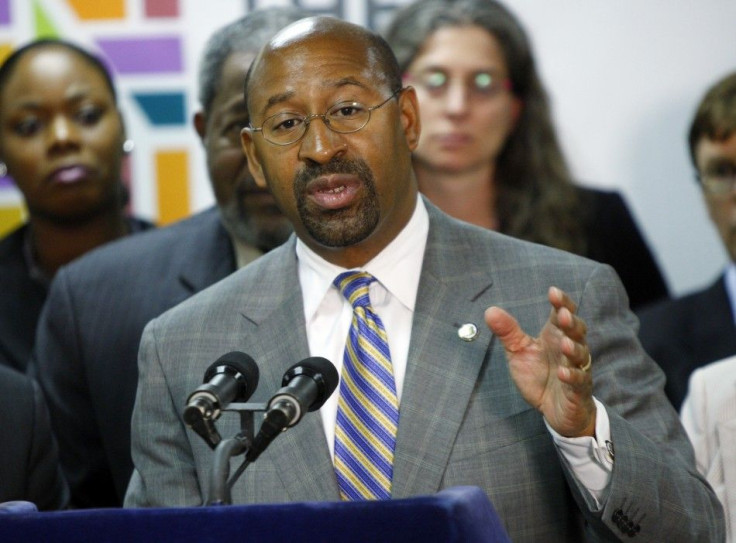Will Philadelphia's Flash Mob Curfew be Effective?

Residents of London have only just learned what the people of Philadelphia, Penn. have known for over a year. Sometimes, there is no excuse for violence. Sometimes, chaos can be combated, but not explained.
The city of brotherly love has been plagued by violent "flash mobs" since May 2010, but most especially during these summer months, when young people take to the lively streets of Center City Philadelphia. Seemingly out of nowhere, groups of between a dozen and 200 people -- primarily African American teenagers -- gather to wreak havoc. With safety in numbers, the youths attack bystanders, break windows and rob anyone nearby.
The most recent flash mob occurred on July 29, when about 30 teenagers near City Hall severely beat two people, leaving one unconscious and the other needing surgery for a broken jaw. In June, some gangs attacked pedestrians and people leaving restaurants while others robbed train passengers. Still others walked into stores and businesses and walked out with stolen goods.
"There's nothing good you can say about them," Paul Levy, executive director of a business organization called Center City District told AFP.
"These are random acts of violence that occurred because people thought they could get away with it."
Monday marks the close of the first weekend under new curfew laws in Philadelphia, the city's most significant attempt to curb the flash mob problem yet. Under the city-wide ordinance, anyone under the age of 18 must be indoors by midnight, and anyone under 13 has of be off the streets by 10 p.m.
The curfew is more severe in the Center City and University City neighborhoods, where anyone 17 or younger must be home by nine p.m.
If a lack of flash mobs is the indicator of success, then, for at least the past few days, the curfew has worked. The police apprehended around 50 kids who were out too late over the weekend. The juveniles will face fines for as much as $300.
"We will be prosecuting these young criminals to the fullest extent of the law," District Attorney Seth Williams said in a statement. "There is no excuse for what they did, and they have brought great shame upon themselves and their families."
Significantly, Philadelphia's Mayor Michael Nutter is also holding parents responsible for the mobs, and they could receive fines of $500 for letting their children out onto the street.
"I want to strongly encourage parents and guardians to be vigilant and to look out for their children this weekend," Nutter said last Friday. "There is no excuse for young people to be able to participate in coordinated, violent behavior if parents are doing their job. It is your responsibility, not the government's, to watch your kids."
Mayor Nutter also slammed parents who had lost control of their children. He blames inattentive parents for creating an environment in which unsupervised teenagers can run amok at their pleasure.
"If you're just hanging out out there, maybe you're sending them a check or bringing some cash by. That's not being a father. You're just a human ATM. ... And if you're not providing the guidance and you're not sending any money, you're just a sperm donor," he said.
"I have an understanding of what of our parents are facing, but others are in very challenging situations, and I appreciate that and understand that, but there is no excuse for young people being out so late at night by themselves and then making bad decisions and literally assaulting other citizens," Mayor Nutter told CNN's American Morning last week. "I will not tolerate that."
Police say that flash mob participants are communicating with each other through Facebook and text messaging. However, what cannot be known is whether or not these mobs would take place without social media.
In London, looters coordinated primarily through BlackBerry Messenger, causing a public backlash against Research in Motion. And when protesting popped up all over the Arab world last winter, Twitter and Facebook were applauded for their role in popular uprisings against tyrannical governments.
"It's basically fashionable to talk about Facebook or Twitter but we don't focus on other very important elements of human life that played a role," said Libyan writer Hisham Matar.
While Matar was talking about the positive changes that occurred during the Arab Spring, his words apply to Philadelphia's flash mobs as well. Little is known about why these things are happening; all that is known is that they are.
In London last week, the media tried to grasp at the cause of the riots, coming up with a number of possibilities, including high unemployment, racial discrimination, and even third-world immigration policy. But in the end, as rioters torched cars and looted as much as they could carry, it appeared to be about little more than opportunity. If given a change, it seems that some members of society will embrace their violent instincts.
In England, the initial ineffectiveness of London's police may have contributed to the scale of the violence. And Mayor Nutter may be right that poor parenting has eliminated the social consciousness of a young demographic. But what really matters now, in the present, as people in Philadelphia are pulled from their cars and brutally assaulted on the street, is how to stop it. It seems that curfews are working, for the time being.
Once the flash mob problem has been curbed, then a society can start to repair itself, assuring that such events don't happen in the future.
© Copyright IBTimes 2025. All rights reserved.





















